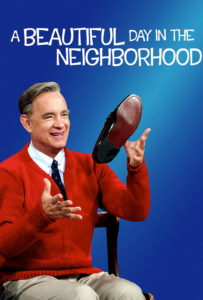A Beautiful Day in the Neighborhood
Posted on November 21, 2019 at 5:16 pm
A-| Lowest Recommended Age: | Middle School |
| MPAA Rating: | Rated PG for some strong thematic material, a brief fight, and some mild language |
| Profanity: | Some mild language |
| Alcohol/ Drugs: | References to substance abuse, drinking and drunkenness |
| Violence/ Scariness: | Scuffles, punch, illness, sad death of a parent |
| Diversity Issues: | None |
| Date Released to Theaters: | November 21, 2019 |
| Date Released to DVD: | February 17, 2020 |

So, Rogers is not the story here. Instead, it is about the impact he had on one troubled adult, and what that means about and for each of us.
Based on the true story of journalist Tom Junod, who interviewed Rogers for a 1998 profile in Esquire, this film, by Micah Fitzerman-Blue and Noah Harpster and directed by Marielle Heller (“Can You Ever Forgive Me?” “The Diary of a Teenage Girl”), is about how the experience of interviewing, or, rather, attempting to interview Fred Rogers was transformational in the life of the reporter (here called Lloyd and played by Matthew Rhys).
Lloyd is a new father struggling with unresolved feelings of abandonment and anger at his own father (Chris Cooper). He is a hard-hitting, skeptical, investigative journalist, not accustomed to or comfortable with assignments to write fluffy features about the hosts of television shows for children. He is assigned to write about Mr. Rogers for the “heroes” issue of Esquire. But he is not someone who takes easily to the idea of heroes. Is his inclination to expose what prominent or influential people want to hide based in part on the father who let him down? Perhaps. But is that the right approach to Mr. Rogers? “Don’t ruin my childhood,” his wife warns. And when he asks Mr. Rogers about how he differs from the character he plays on television, the gentle clergyman-turned-unlikely-television-star genuinely does not understand the question. He cannot be anything other than what he is.
More important, he has a “compulsive intimacy” that prompted him to ask questions far more insightful and meaningful than the ones Lloyd was asking him to answer for the article.
Director Marielle Heller and screenwriters Micah Fitzerman-Blue and Noah Harpster bring a lovely delicacy and an almost fairy tale quality to the story. At times it seems we are watching an episode of the series and then we see that the “real world” and the world of the show blend together — both the “real” home where Mr. Rogers changes into his cardigan and sneakers and feeds the fish and the “imaginary” world of the kingdom of Make Believe. Just as all of the characters on the show represent parts of Fred Rogers’ personality, the heart of the movie is integrating all of its worlds and emotions.
A story relies on some kind of change experienced by the main character. He or she has to lose something or learn something or complete something. Mr. Rogers was already so evolved that trying to make him the main character of a feature film would not have worked. So wisely the story here is about the effect Mr. Rogers had on one troubled soul, helping him to lose something, to learn something, and to complete something. And in doing so, it helps us locate some of the compulsive intimacy that makes Mr. Rogers’ viewers into friends who feel accepted, understood, and very lucky to be in his neighborhood.
NOTE: Look carefully at the other customers in the scene set in a Chinese restaurant, when Mr. Rogers and Lloyd are eating together. They are the real-life friends and family of Mr. Rogers, including his wife Joanne (played by Maryann Plunkett in the film) and his producer Bill Isler (played by Enrico Colantoni).
Parents should know that this movie includes frank depiction of family dysfunction with an adult son still resentful and angry about his father’s abandonment, drinking and drunkenness, a scuffle, terminal illness, and some mild language.
Family discussion: How would you answer Mr. Rogers’ questions? What did Lloyd learn from him?
If you like this, try; the documentary “Won’t You Be My Neighbor?” and the episodes of “Mr. Roger’s Neighborhood” and my interview with the journalist whose article inspired the film and the men who wrote the screenplay.
